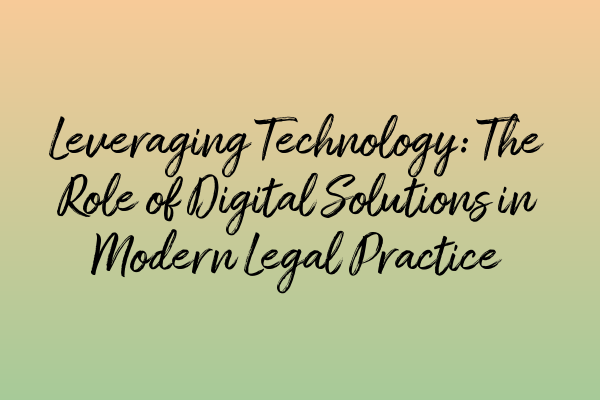Leveraging Technology: The Role of Digital Solutions in Modern Legal Practice
In today’s fast-paced digital world, technology has revolutionized almost every industry, and the legal profession is no exception. With the advent of digital solutions, law firms can streamline their processes, improve efficiency, and better serve their clients. In this article, we will delve into the role of digital solutions in modern legal practice and explore how they can benefit both solicitors and their clients.
Streamlining Administrative Tasks
One of the key benefits of digital solutions in the legal field is their ability to streamline administrative tasks. From document management software to electronic filing systems, technology offers solicitors the tools they need to organize and access information quickly and efficiently. This not only saves time but also improves accuracy and reduces the risk of human error.
Furthermore, digital solutions enable solicitors to automate recurring tasks, such as generating invoices, scheduling appointments, and sending out reminders. By automating these processes, solicitors can focus their time and energy on more important aspects of their practice, such as legal research and client representation.
Enhancing Communication and Collaboration
In a profession that thrives on effective communication and collaboration, digital solutions play a crucial role in facilitating seamless interactions between solicitors, clients, and other stakeholders. With the use of email, instant messaging, and video conferencing tools, solicitors can stay connected with clients regardless of their physical location.
Additionally, cloud-based document management systems allow solicitors to share and collaborate on files with clients and other legal professionals in a secure and efficient manner. This eliminates the need for physical paperwork and enables real-time collaboration, ultimately improving the overall client experience.
Improving Legal Research
Legal research is a vital part of a solicitor’s practice, and digital solutions have significantly transformed the way legal professionals conduct their research. Gone are the days of flipping through voluminous law books; today, solicitors have access to extensive online databases, legal research platforms, and AI-powered tools that can quickly analyze and extract relevant information from vast amounts of legal documents.
These digital tools not only save time and effort but also enhance the accuracy and comprehensiveness of legal research. Solicitors can now access a wealth of legal precedents, case laws, and academic journals with just a few clicks, allowing them to provide more accurate and well-informed advice to their clients.
Expanding Client Reach
Digital solutions have also opened up new avenues for solicitors to expand their client reach and grow their practice. With a professionally designed website and a strategic online marketing strategy, solicitors can attract clients from a wider geographic area and reach potential clients who may not have been aware of their services otherwise.
Search engine optimization (SEO) plays a crucial role in ensuring that a law firm’s website ranks higher in search engine results. By integrating relevant keywords, producing high-quality content, and earning backlinks from reputable legal websites, solicitors can improve their online visibility and increase their chances of attracting clients who are actively seeking legal services.
Furthermore, by leveraging the power of social media platforms, solicitors can engage with potential clients, share legal insights, and build a strong online presence. This not only helps in attracting clients but also enhances the firm’s reputation and credibility in the legal industry.
Conclusion:
From streamlining administrative tasks to enhancing communication, improving legal research, and expanding client reach, digital solutions have become integral to modern legal practice. Solicitors who embrace these technologies can gain a competitive edge, deliver better client experiences, and ultimately drive the success of their firm.
To explore more interesting aspects of criminal practice and legal defense, you may find the following articles helpful:
- Private Prosecutions: Exploring Non-Governmental Prosecutions in Criminal Cases
- Ethical Challenges in Criminal Defence: Navigating Dilemmas
- Understanding Drug-related Offences: Laws and Penalties in the UK
- Magistrates’ Court vs Crown Court: Different Paths in Criminal Proceedings
- Criminal Defence Strategies: Expert Approaches to Protecting Clients’ Interests


Leave a Reply